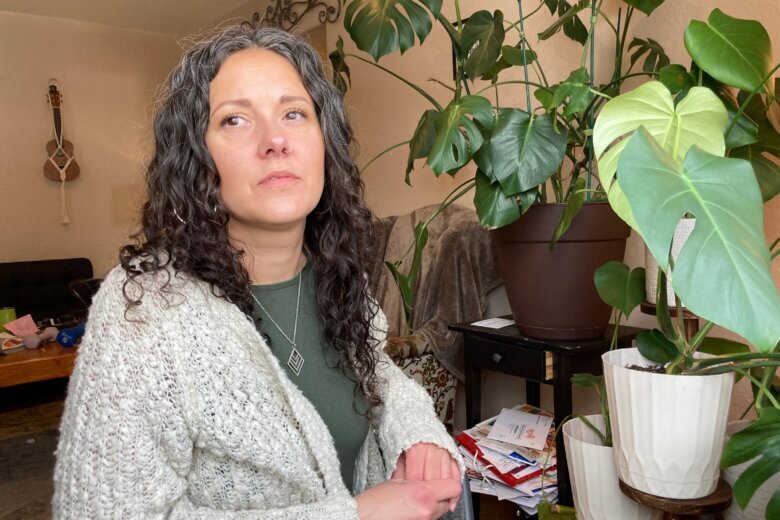
(CNN) — Sporting retro ’50s hairstyles and cinched aprons, “tradwife” influencers have taken over a pocket of the internet.
These traditional wives who showcase 30-second videos of homemade sourdough bread content, and other glimpses into the making of a perfect home, are no ordinary stay-at-home moms. They steadfastly believe in traditional gender roles. That means staying devoted to housework and taking care of the children — and being subservient to their working husbands.
Enitza Templeton of Littleton, Colorado, embodied the tradwife lifestyle for 10 years. At 4 a.m., she would start making bread and begin prep for the day’s meals — always from scratch. The mother of four would do all of the household chores, while her husband focused solely on breadwinning.
Now, after escaping a life that was “miserable” and “unfulfilling,” Templeton shares her story with her social media following and podcast listeners — to help other women who find themselves in similar situations and want a new life.
“Social media can make everything look really pretty, because it’s a 30-second clip, but 30 seconds out of 10 years really omits a lot of the ugliness in those relationships,” she said.
Templeton, now 41, said she was raised as an evangelical Christian, believing that a husband had authority over his wife. But today, she is a divorced single mom by choice and advocates for women who wish to break free from a relationship dynamic that all too easily can create an extreme power imbalance.
The world of traditional wives
Tradwife influencers romanticize and glamorize the period before and directly after World War II — a time when most women were homemakers. Some tradwives also take a stance against the feminist movement, believing only men should be in the workplace while women focus on homelife.
Like any relationship, the tradwife arrangement does not always make for a happy couple with no family issues. Templeton felt as if the daily menial tasks were meant to distract her from her lack of autonomy and independence, and the pressure to be perfect was bearing down on her.
“There are people in traditional marriages that are happy, absolutely happy,” said Christine Borzumato-Gainey, a counselor and adjunct professor in the department of human services at Elon University in North Carolina. “It’s really just a high-risk situation that somebody could get lost and overwhelmed by the duties that they have, and not be treated with respect or appreciated by their partner who is completely in charge of the finances and other major decisions.”
In the world of traditional wives, the husband has the authority when it comes to financial choices. But the control can stretch even farther, in which some women cannot leave the house without permission, and in some relationships, punishments are put in place. The arrangement allows room for financial abuse, holding all money and power over the other person’s head, and emotional abuse, which leads to one partner losing their self-agency and confidence, said Suzanne Degges-White, a licensed counselor and professor and chair of Northern Illinois University’s department of counseling and higher education in DeKalb, Illinois.
“It can give the partner who is working an awful lot of power. … It should be a shared partnership,” Degges-White said. “All of us should be encouraged to have this sense of agency — meaning we can be active and we can take control of our lives, and we can do something that’s needed to contribute to the greater good.”
At 24, Templeton began to feel the pressure of needing to get married as soon as possible. Shortly after she got married at 26, she had her first child and quit her job to become a full-time homemaker.
“I was just doing the next thing in life because I thought that’s what you’re supposed to do. And I thought, like, happiness in my life will start then,” Templeton said.
Templeton, who had always wanted to be a mom, still felt empty and alone after the birth of her first child. “I started thinking like, oh, maybe more kids. I’m just not enough of a mother. I just need more kids to really flex my mom muscle, and then I’ll be fully satisfied.”
Templeton’s eldest child is only six years older than the youngest. But she still did not feel fulfilled, and the communication in her marriage was dwindling. Templeton sought support from a therapist, who helped her realize her relationship was “weighted wrong.”
“Anytime that something is romanticized, you have to really question whether it exists in reality. … You’re really risking, and expecting actually, that the other person has your best interests at heart — you’re kind of abdicating that responsibility for oneself,” Borzumato-Gainey said.
Precautions to take
When Templeton saw that her relationship was making her unhappy, she began to take steps that would help her be independent following the divorce. She got a job — despite her 10-year gap on her resumé — and got her finances in order so she could take care of herself and her four children.
It was daunting to start over at 37, she said, but after receiving help from food stamps and getting a job at her kids’ school, Templeton began to see that her spending had actually gone down, now that the one source of income was only for her and her four kids.
When she left her traditional marriage, it was an instant relief, she said. Templeton’s advice for other women still in the lifestyle is to think back to when they were little girls and ask themselves whether that is truly what they wanted to do for all their lives.
“You don’t want your entire identity to be wrapped up in anything. You want a diversified identity,” said Dr. Kelly Campbell, the interim vice provost and co-chief diversity officer at California State University in San Bernardino. “It’s good to have a loving relationship that you derive so much satisfaction from, but you can’t lose your own identity through that relationship.”
It is important to keep strong relationships with friends and family, so there will be a support system in place if the marriage doesn’t work out, Campbell said. Several tradwife influencers have stated they don’t see a necessity in having a backup plan, but it is crucial to at least have an idea of how one could make their own income if the situation were to change unexpectedly, Templeton said.
“You want to make sure that the stay-at-home partner still has some balance in their life and remembers who they are as a person — and is able to pursue passions that they’re interested in that is not just their partner’s passions,” said Campbell, a former professor of psychology who has taught classes in interpersonal relationships and gender.
Keeping open communication between partners and having clear boundaries and expectations put in place for the relationship also can help, Borzumato-Gainey said.
How to live a happy ‘tradwife’ lifestyle
Alexia Delarosa currently lives the traditional wife lifestyle. While she does not label herself a tradwife, people often associate her with the description for her traditional homelife that she shares on social media — and she doesn’t correct them.
Delarosa currently and happily embodies the traditional lifestyle — her husband works, while she stays home with the kids. But she doesn’t think the lifestyle is for everyone.
“I don’t think that there’s one way to live or one way that a family’s dynamic should work,” Delarosa said. “Every family is so different.”
Delarosa always knew she wanted to be a mom, and as she got older, she began to see the vision of the lifestyle in her head. “I wanted to be the one that was at home with them. And you know, doing all the activities and cooking and baking and all of that good stuff. So, it was always a plan. And luckily, it worked out for my family.”
Her advice for women who want a similar lifestyle, or are currently in the lifestyle, is to make sure both partners have goals and visions that align. And have the conversations early on about what is expected.
For those living the tradwife lifestyle, it is important to not put too much pressure on yourself, and to give grace to your partner as well, while asking for help when it is needed, she said.
“Everything is not perfect all the time, it’s easy to make it look that way. You know, on social media,” Delarosa said. “I definitely have high standards for myself, and how I want my day to go and how I want things done and how I want things to look, so I try to achieve that vision for myself. But if I don’t hit the mark every single time, that’s also not the end of the world.”
Delarosa makes separate income from her social media accounts, but as far as needing a backup plan, she said it depends on the relationship and the situation. “Everyone just needs to look at their own situation and know what’s necessary for them.”
Whether your identify as a tradwife or feminist, there is not one correct way to live, Delarosa said. “This is what I personally do and what works for our family and I love it. And if you don’t agree with it, that’s fine. And if you love it too, then awesome. We have something in common.”
Put on a pedestal
While Templeton was raised to believe in the tradwife lifestyle, she ensures her daughters are growing up knowing they have a choice, and fosters conversations about careers they may be interested in when they are older.
Templeton believes it is important for kids to see that their mom is not perfect all the time, and often shares this message and other advice on being a mom with her podcast “Emerging Motherhood.”
“Putting moms on this pedestal of perfection is damaging to literally everybody, the whole entire world. Because when your mom falls — because she will, she is a human — you’re going to be so hurt that she fell from so high,” Templeton said.
When Templeton posted about her experience on TikTok in January, her video went viral, reaching over 2 million views. The video received comments from other people who had a similar experience — “I got my degree before I had my son. And thank goodness (because) yep — he left me too,” one user commented. “Did the trad wife life. Now divorced, rebuilding with my six,” another commented.
Since then, Templeton has made several videos answering questions about the tradwife life and how she left it, while her podcast focuses on advice for single mothers.
“I do it to inspire others, but I also do it because so many people keep inspiring me to keep doing it,” Templeton said. “It’s been my saving grace.”
The-CNN-Wire
™ & © 2024 Cable News Network, Inc., a Warner Bros. Discovery Company. All rights reserved.








